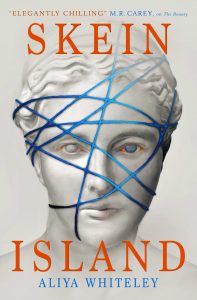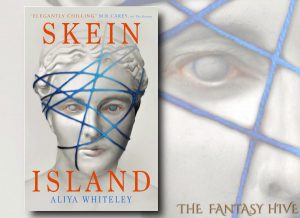SKEIN ISLAND by Aliya Whiteley (BOOK REVIEW)
“I keep her trapped in my words. I hold her prisoner, and that is what she deserves”
 Aliya Whiteley writes across many different genres and lengths. Her 2014 SF-horror novella The Beauty was shortlisted for the James Tiptree and Shirley Jackson awards. The following historical-SF novella, The Arrival of Missives, was a finalist for the Campbell Memorial Award, and her noir novel The Loosening Skin was shortlisted for the Arthur C Clarke Award. Published in 2020, her novels Greensmith and Skyward Inn have been works of speculative fiction. Her short story collection From the Neck Up was published in 2021. She has written over one hundred published short stories that have appeared in Interzone, Beneath Ceaseless Skies, Black Static, Strange Horizons, The Dark, McSweeney’s Internet Tendency and The Guardian, as well as in anthologies such as Unsung Stories’ 2084 and Lonely Planet’s Better than Fiction.
Aliya Whiteley writes across many different genres and lengths. Her 2014 SF-horror novella The Beauty was shortlisted for the James Tiptree and Shirley Jackson awards. The following historical-SF novella, The Arrival of Missives, was a finalist for the Campbell Memorial Award, and her noir novel The Loosening Skin was shortlisted for the Arthur C Clarke Award. Published in 2020, her novels Greensmith and Skyward Inn have been works of speculative fiction. Her short story collection From the Neck Up was published in 2021. She has written over one hundred published short stories that have appeared in Interzone, Beneath Ceaseless Skies, Black Static, Strange Horizons, The Dark, McSweeney’s Internet Tendency and The Guardian, as well as in anthologies such as Unsung Stories’ 2084 and Lonely Planet’s Better than Fiction.
I stumbled upon Aliya Whiteley’s 2019 novel, Skein Island, by pure chance. After welcoming Whiteley to our annual Current Research in Speculative Fiction Conference (CRSF2022) at the University of Liverpool, I was eager to purchase her books and get lost in her narratives. I contracted covid, read Skyward Inn (Arthur C Clarke award short-lister 2022), then I ordered more. Skein Island ended up on the ever-growing TBR pile, lying forgotten for several months. I am delighted that when I reached into the pile for things to read on annual leave, the cloudy blue eyes on the front cover of this novel looked out at me, and so Skein Island, went into my suitcase. From the moment I opened the book, I did not stop reading, until all 276 pages had been devoured and imprinted into my mind.
Oxford English Dictionary defines ‘Skein:’ A quantity of thread or yarn, wound to a certain length upon a reel, and usually put up in a kind of loose knot.
Skein Island is another excellent example of Whiteley’s undeniable skill to ignore genre tropes, manipulate all context, disorientate, and impress. Whiteley says herself:
“I like those moments in stories where you have no idea what’s going to happen next. The moments when genre can’t save you.”
I believe this is the reason Whiteley attempts to include as many of these moments as possible in her narratives, intricately weaving her tales into loose, malleable knots, which reflects the aptly given title of this genre-defying historical fiction – speculative fiction – new wave – feminist – mythological – Mystery – phantasmagorical – fairy tale – fantasy novel. In the story, we follow the protagonist Marianne to Skein Island, and there is absolutely no conceivable way anyone could have guessed what would happen next.
“Sorry to be the bearer of bad news here, but it has to be your fault. Your wife’s not happy, it’s not your fault. Trust me”
Marianne works in the library, she has a nice husband called David, a seemingly alcoholic father named Arnie and a mother who went to Skein Island seventeen years ago, never to return to her hometown, Wootton Bassett (which is a real market town in Wiltshire). Her life has the essence of ‘familiarity’ and ‘ordinary,’ until halfway down page one. Marianne receives a letter from Lady Amelia Worthington, inviting her to Skein Island.
“Each man delights in the work that suits him best”
Skein Island is an island (who would have guessed?), which lies in turbulent waters about twelve miles from the coast of Devon. It has been welcoming visitors since 1945, when Lady Amelia Worthington (a reclusive ex-explorer and traveller) bought the island and set it up as a retreat for women. Women, from the age of 16, can apply for an all-inclusive week away on the island, paying only with a written Declaration to add to the island’s ever-growing library, this Declaration much be a story from their past.
“I don’t believe every monster, real or imaginary, needs to be faced. But the one in this house does”
Believing the island to be an escape from reality, men and the traumatic events that happen on the night she receives her invitation, Marianne grabs a bag and heads to the island, leaving her husband David behind. Marianne wants to find out why she has been invited without applying in the first place, and hopefully, she will find out what happened to her mother and why she never came home.
“I run my finger over the letterhead. – Skein Island”
Whiteley uses the usual building blocks to make the reader believe or assume that this novel could be a mystery novel (finding mummy) or some sort of escapism (the type littered with romance or women empowerment). As you read on, like with some of Whiteley’s other work, the defining lines between genres are disrupted. One moment you are engaged with Marianne’s pain and empathise with someone who cannot find their mother, the next moment there is talk of monsters.
“The women tried desperately to get us to leave, telling us it wasn’t safe. They spoke of horrors in the mountains, a monster that incited men to madness”
Whiteley stitches many moments into this novel, far too many to mention without entirely ruining it for you, but the narrative is delicately constructed. The many layers of pain, love, sex and Greek mythology seep off the page and hold your attention. Whilst many men within the narrative are given a rough time in the story and the momentum of the narrative gives you a little bit of whiplash (emotionally) if one is familiar with Greek Mythology, The Fates and Whiteley’s other novels, this will not come as a shock. Skein Island is disturbing, unexpected and beautiful.
Read. It.
“Amelia told me there are only four types of men in the world: red, blue, green and yellow.”

